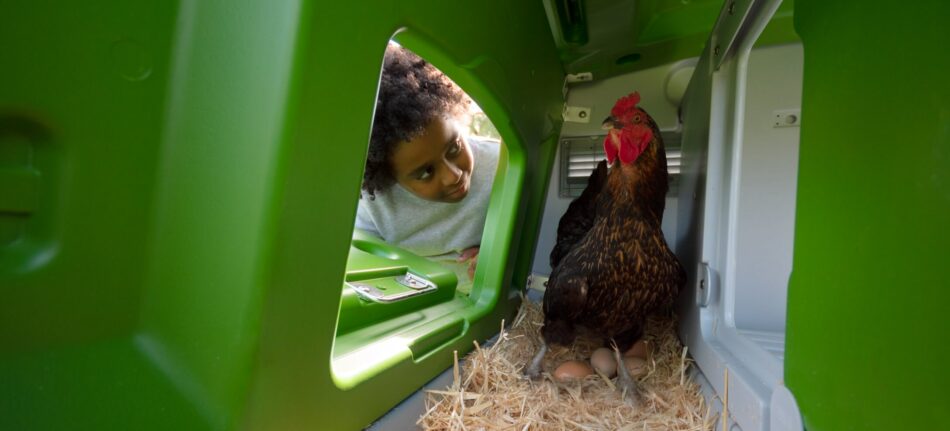Everything you need to know about chicken eggs
Everything you need to know about chicken eggs is this: they’re amazingly healthy for humans, are laid regularly by endearing backyard birds, and are a culinary staple in virtually every type of cuisine. But while all chicken eggs are healthy, they aren’t all identical. Your chickens’ eggs can even tell you about the health of your hens and their genetics. Dive into the wonderful world of chicken eggs, and discover fascinating facts about the world’s favourite breakfast staple.
Eggs are healthy for humans
Collecting eggs is one of the best parts of being a chicken keeper. Not only are they delicious and look spectacular when displayed on your kitchen counter, they’re also super nutritious. In fact, chicken eggs contain small amounts of nearly every vitamin and mineral that humans require. They’re rich in healthy omega-3 fatty acids and folate, as well as vitamin D and choline.
How do chickens lay eggs?
Contrary to popular belief, hens do not need the rooster in order to produce eggs. So how do chickens know when to lay eggs? The answer lies with the sun. Hens have a special receptor in their eye called the pineal gland, which communicates to the rest of their body that it’s time to ovulate, or produce an egg. This sensitivity to light is one of the reasons why hens lay fewer eggs during the winter months — there’s less daylight to prompt ovulation.
Once light enters the pineal gland, an oocyte (the egg yolk) is released from a hens’ ovary. The yolk begins its journey through a hen via the oviduct. If you have a rooster in your flock, it is at this point that a yolk could become fertilized. But, regardless of a rooster being present, the yolk will continue its journey through the oviduct, where it will be wrapped in the egg white, known as albumen.
The final stop for an egg is a hens’ uterus, which is called the shell gland. Over the course of about 20 hours, the shell gland will encase the albumen-wrapped yolk in the characteristic shell that we know and admire. If your hen lays coloured eggs, it’s here where the pigment is applied. Once done, a hen’s uterus personally deposits the egg through the cloaca and into the nest to keep it clean and protected from feces, which share the same exit route. Shortly after an egg has been laid, hens will start the process all over again, with most laying breeds producing an egg 26-36 hours.
Not all chickens lay brown eggs
You’ve seen brown eggs, and you’ve probably even seen white eggs. But did you know that chickens can also lay eggs in hues of blue, green, and even pink? Technically speaking, all egg shells start out white, thanks to calcium being their primary substance. But chickens with certain genetics have a pigment that is applied to eggs within the shell gland. This pigment is what gives these eggs their colour.
Here are some breeds that lay coloured eggs:
Blue eggs
- Easter Egger
- Ameraucana
- Cream Legbar
Green eggs
- Easter Egger
- Whiting True Green
- Olive Egger (Maran/Ameraucana crosses)
Pink or cream eggs
Eggs can also be speckled, but this is more from an individual hen’s distinct laying habits rather than genetics. There are some breeds that are more prone to laying speckled eggs, but the freckled appearance is from calcium deposits during the shell formation. Any hen can potentially lay speckled eggs, but even those that do may not continue to do so throughout their lifetime.
What eggs tell you about hen health
A hen’s eggs can tell you a lot about their overall health. Chickens that lay misshapen eggs or those without shells may be experiencing stress or illness. And, if hens stop laying altogether for any reason other than their annual chicken moult, this can also spell trouble.
Isolated events of strange eggs in the nesting box usually isn’t a cause for concern. And, pullets that are just beginning to lay will often produce elongated, pointed eggs their first couple of months. This is normal, and their eggs will slowly transition into the traditional shape.
If your mature hens suddenly stop laying eggs, or produce eggs that are elongated, misshapen, bumpy, or missing their shells, there are a few things to consider to get to the bottom of the cause:
- Bumpy shells are small calcium deposits on the egg. Decreasing your flock’s calcium intake will help resolve bumpy eggs.
- Eggs that have extremely soft shells or no shells at all are due to a lack of calcium in your hens’ diet. While startling to find, offering a calcium supplement free-choice to help prevent or correct soft-shelled eggs.
- Elongated or misshapen eggs are usually a sign of illness or stress in adult chickens. Call your veterinarian if you notice more than one elongated egg in the nesting box from mature hens.
Fun facts about chicken eggs
Here are some fun or lesser-known facts about chickens and their eggs:
- Hens have two ovaries, but their right ovary becomes dormant shortly after they hatch. This means that throughout a hen’s life, eggs will only be released from the left ovary.
- An egg’s colour, shape, and size have no effect on its taste or nutritional value.
- On average, a single hen will lay between 260-325 eggs each year. The world record was set by a White Leghorn hen in 1970, with a total of 371 eggs in a single year.
- Eggs are one of the most complete sources of protein.
- One egg contains 6 grams of protein and 70 calories.
Omlet and your flock
Your backyard flock provides you and your family with nutritious and delicious eggs year-round. Provide them with the best living quarters to assist them in their amazing endeavour. Safe, insulated chicken coops, fully enclosed chicken runs and smart automatic chicken coop doors all promote and support healthy egg laying habits. Just just wonder what it’s like to have chickens, we’re here to tell you — it’s wondrous.
This entry was posted in Chickens


